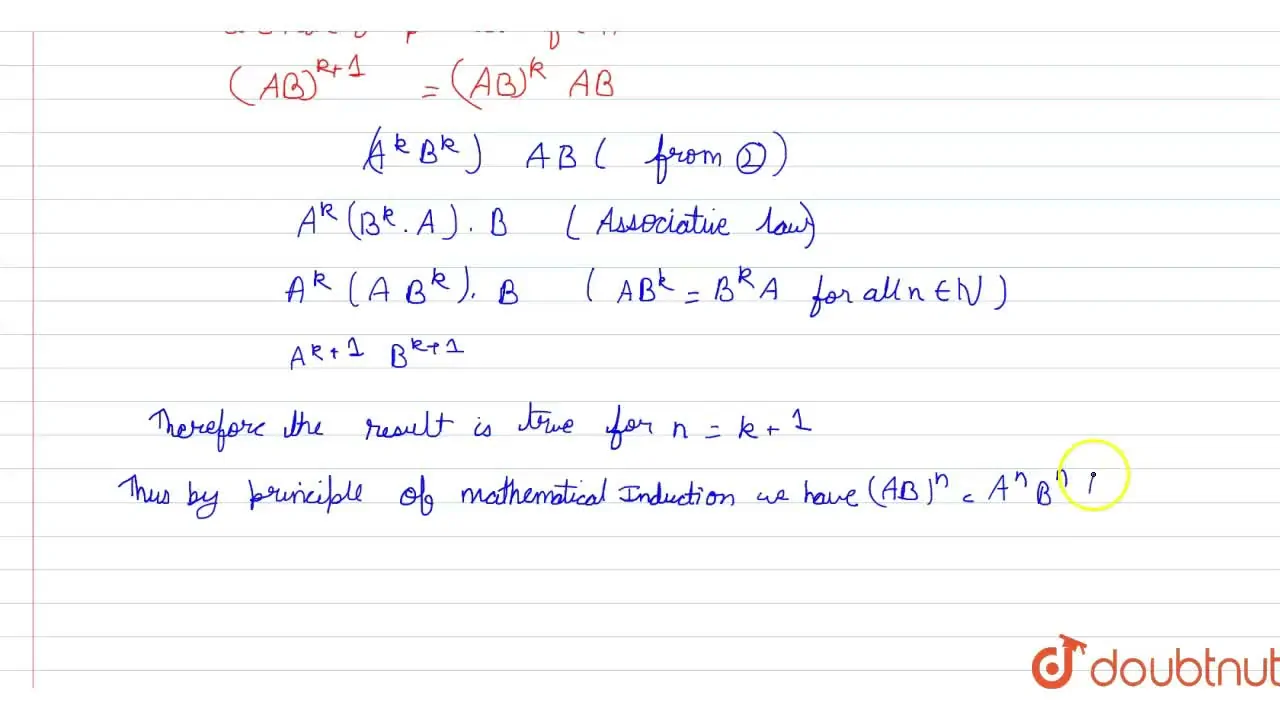If A and B are square matrices of the same order such that AB=BA, then proveby induction that ABn=BnA. Further, prove that (AB)n=AnBnfor all n∈N.
A and B are square matrices of the same order such that AB=BA.
To prove : P(n):ABn=BnA,n∈N
For n=1, we have
P(1):AB=BA [Given]
⇒AB1=B1A
Therefore, the result is true for n=1.
Let the result br true from n=k.
i.e., P(k):ABk=BkA (1)
Now, we have to prove that the result is true for n=k+1.
ABk+1=ABkB
=(BkA)B [Using (1)]
=Bk(AB) [Associative law]
=Bk(BA) [AB=BA(Given)]
=(BkB)A [Associative law]
=Bk+1A
Therefore, the result is true for n=k+1.
Thus, by the principle of methematical induction, we have ABn=BnA,n∈N.
Now, we have to prove that (AB)n=AnBn for all n∈N.
For n=1, we have
(AB)1=A1B1=AB
Therefore, the result is true for n=1.
Let the result be true for n=k.
i.e., (AB)k=AkBk (2)
Now, we have to prove that the result is true for n=k+1.
(AB)k+1=(AB)k(AB)
=(AkBk)(AB) [Using (2)]
=Ak(BkA)B [Associative law]
=Ak(ABk)B [ABn=Bn for all n∈N]
=(AkA)(BkB) [Associative law]
=Ak+1Bk+1
Therefore, the result is true for n=k+1.
Thus, by the principle of mathematical induction, we have (AB)n=AnBn, for all n∈N.
Related Playlists
- BOOK - CENGAGE ENGLISHCHAPTER - MATRICESEXERCISE - CAE 13.15videos
MATRICES
- BOOK - CENGAGE ENGLISHCHAPTER - MATRICESEXERCISE - CAE 13.26videos
MATRICES
- BOOK - CENGAGE ENGLISHCHAPTER - MATRICESEXERCISE - Single correct Answer34videos
MATRICES
- BOOK - CENGAGE ENGLISHCHAPTER - MATHMETICAL REASONINGEXERCISE - Archives10videos
MATHMETICAL REASONING
- BOOK - CENGAGE ENGLISHCHAPTER - METHODS OF DIFFERENTIATIONEXERCISE - Single Correct Answer Type46videos
METHODS OF DIFFERENTIATION
Similar Questions
If A,BandC three matrices of the same order, then prove that A=B⇒A+C=B+C
View SolutionIf A and B are any two different square matrices of order n with A3=B3 and A(AB)=B(BA) then
View SolutionLet A; B; C be square matrices of the same order n. If A is a non singular matrix; then AB=AC then B=C
View SolutionIf AandB are square matrices of the same order and A is non-singular, then for a positive integer n,(A−1BA)n is equal to A−nBnAn b. AnBnA−n c. A−1BnA d. n(A−1BA)
View SolutionIf A and B are two sets such that n(A)=115, n(B)=326, n(A−B)=47 , then write n(A∪B).
View SolutionLet A,B be two matrices such that they commute, then for any positive integer n,
(i) ABn=BnA
(ii)(AB)n=AnBnView SolutionIf B,C are square matrices of order n and if A=B+C,BC=CB,C2=0then which of the following is true for any positive integer N
View SolutionIf there are three square matrix A, B, C of same order satisfying the equation A2=A−1andB=A2nandC=A2(n−2), then prove that det.(B−C)=0,n∈N.
View SolutionIf A and B are square matrices of order n, then prove that AandB will commute iff A−λIandB−λI commute for every scalar λ.
View SolutionIf A and B are square matrices of order n, then prove that AandB will commute iff A−λIandB−λI commute for every scalar λ.
View Solution


